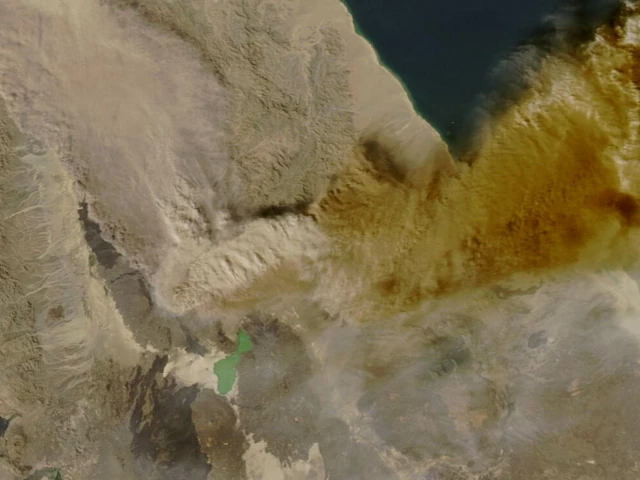The situation persisted for 18 to 20 hours before it began to stabilize, without any effects being felt, the spokesperson said.
A satellite image shows ash rising from the eruption of Ethiopia’s Hayli Gubbi volcano as it drifts over the Red Sea. PHOTO: NASA/handout via REUTERS
Pakistan faces no threat of air pollution from the volcanic eruption in Ethiopia, the Pakistan Meteorological Department said on Tuesday, assuring that the ash cloud remains confined to high altitudes and poses no risk to public health in the country.
PMD deputy director and spokesperson Anjum Nazir Zaigham said the Hayli Gubbi volcano eruption – reported by the Toulouse Volcanic Ash Advisory Center (VAAC) – sent massive plumes into the upper atmosphere after it erupted on Sunday for the first time in almost 12,000 years.
In response, the PMD issued an air surveillance alert, warning that domestic flights operating at around 35,000 feet and international flights operating between 40,000 and 45,000 feet could face engine hazards due to the ash cloud. Authorities, he added, were actively monitoring its trajectory.
In a detailed statement on Tuesday, Zaigham said the volcanic plume first moved eastwards, extending across Oman, Yemen and the Arabian Sea before spreading towards southern Pakistan and India.
BREAKING: Major eruption reported in Afar, Ethiopia 🌋
Urgent reports this morning are of a major volcanic explosion in the Afar region, either in Ali Bagu (Amaytole) or possibly in Erta Ale itself. Initial information suggests that the eruption could be located between… pic.twitter.com/ChwmyT9vDZ
– Volcaholic 🌋 (@volcaholic1) November 23, 2025
The PMD issued three consecutive volcanic ash advisories (VAAs) – the first time in Pakistan’s history that multiple advisories were issued in succession – after receiving a mid-flight report from an aircraft south of Gwadar, about 60 nautical miles away.
He said the situation persisted for nearly 18 to 20 hours before conditions began to stabilize. Volcanic remains, however, were only detected in the upper atmosphere, about 45,000 feet or higher, he added.
“These effects never reached the ground,” Zaigham said, adding: “With wind speeds of around 20 kilometers per hour, the plume has now dissipated. It is completely incorrect to suggest that Pakistan’s airspace could be polluted.”
He reiterated that the skies over Pakistan are now “completely clear”, noting that any air quality issues would only arise if an eruption occurs in a country closer to Pakistan. Zaigham reiterated that there is no possibility of atmospheric contamination from the Ethiopian eruption.




